人教版新课标初中英语各单元概要
人教版初中英语教材每个单元的板块总结

人教版初中英语教材每个单元的板块总结Title: Summary of Unit Sections in People's Education Press Junior High School English TextbooksIntroductionThe People's Education Press (PEP) junior high school English textbooks are designed to provide students with a comprehensive understanding of the English language. The textbooks are structured into units, each focusing onspecific topics and language skills. This summary willoutline the main sections found in each unit of the PEPjunior high school English textbooks.Unit StructureEach unit in the PEP junior high school English textbooks is divided into several sections, aimed at developing different aspects of language learning. The sections are as follows:1. Unit ObjectivesThe unit objectives section provides an overview of the language skills, vocabulary, and grammar points that students will learn in the unit. It helps students understand the goals they should achieve by the end of the unit.2. Warming UpThe warming-up section serves as an introduction to the unit topic. It usually includes pre-reading questions, discussion prompts, or activities that engage students in thinking about the theme of the unit. This section helps activate students' prior knowledge and interests, preparing them for the upcoming lessons.3. ListeningThe listening section presents audio materials related to the unit topic. Students listen to dialogues, monologues, or interviews and answer comprehension questions. This sectionhelps students improve their listening skills and develop their ability to understand spoken English.4. SpeakingThe speaking section focuses on developing students' oral communication skills. It includes activities such as pair work, group discussions, role-plays, and presentations. Students practice using the target language to express their ideas, opinions, and feelings about the unit topic.5. ReadingThe reading section offers one or more texts related to the unit theme. The texts may be stories, articles, letters, or advertisements. Students read the texts and answer comprehension questions, learn new vocabulary, and practice reading strategies. This section helps students improve their reading skills and expand their knowledge of the unit topic.6. GrammarThe grammar section introduces the target grammar points of the unit. It provides explanations, examples, and exercises to help students understand and use the grammar structures correctly. This section aims to enhance students' ability to use English accurately and effectively.7. VocabularyThe vocabulary section focuses on teaching new words and expressions related to the unit topic. It includes activities such as matching, filling blanks, and sentence completion. This section helps students expand their vocabulary and use the new words in context.8. WritingThe writing section guides students in developing their writing skills. It may include tasks such as writing emails, notes, essays, or stories. Students practice organizing their ideas, using appropriate vocabulary and grammar, andexpressing their thoughts clearly. This section aims to improve students' ability to communicate in written English.9. Integrated SkillsThe integrated skills section combines the four language skills (listening, speaking, reading, and writing) to provide a comprehensive language learning experience. It may include tasks such as listening and writing, reading and speaking, or completing a project. This section helps students consolidate their understanding of the unit topic and apply their language skills in a meaningful context.10. Review and CheckThe review and check section assesses students' mastery of the unit objectives. It includes exercises, quizzes, or tests that cover the language skills, vocabulary, and grammar taught in the unit. This section helps students evaluatetheir progress and identify areas for improvement.ConclusionThe PEP junior high school English textbooks offer a well-structured and balanced approach to language learning through their unit sections. Each section targets different aspects of language skills, ensuring that students develop a comprehensive understanding of English. By working through the various sections, students can improve their listening, speaking, reading, and writing abilities, expand their vocabulary, and gain confidence in using English.。
最新人教版英语七年级下教材内容总结

最新人教版英语七年级下教材内容总结
本文旨在对最新人教版英语七年级下册教材的内容进行总结,以便帮助学生更好地理解和掌握教材内容。
单元一:你好
该单元是研究问候和自我介绍的基础。
主要内容包括问候语、自我介绍以及简单的数字符号等基础知识。
单元二:我的家
这个单元主要介绍家庭成员和家居环境。
学生将研究如何用英语描述家人、房间和物品,以及谈论自己的家庭生活。
单元三:学校生活
该单元涵盖了学校生活的基本话题,包括学校设施、科目、日常活动等。
学生将研究如何描述学校和学校生活的方方面面。
单元四:我的朋友
这个单元主要围绕着介绍朋友、描述朋友以及谈论朋友的爱好
展开。
学生将了解如何用英语介绍自己的朋友,并能够描述朋友的
特点和爱好。
单元五:我的日常活动
研究谈论日常活动是这个单元的重点。
学生将研究如何用英语
描述自己的日常活动,包括起床、吃饭、上学等。
单元六:美食文化
这个单元介绍了一些与美食相关的话题,例如食物的种类、口
味以及西方餐桌礼仪等。
学生将研究如何用英语谈论美食和食物惯。
单元七:购物
购物是这个单元的主题,主要介绍学生如何用英语描述购物场景、询问价格和购物偏好等内容。
单元八:节日与庆祝
这个单元主要涵盖了一些中国和西方的节日和庆祝活动,例如春节、圣诞节等。
学生将研究如何讨论和描述这些节日。
以上是最新人教版英语七年级下册教材的内容总结。
希望这份总结能帮助学生更好地学习和掌握相关知识。
人教版初中八年级英语各单元重点
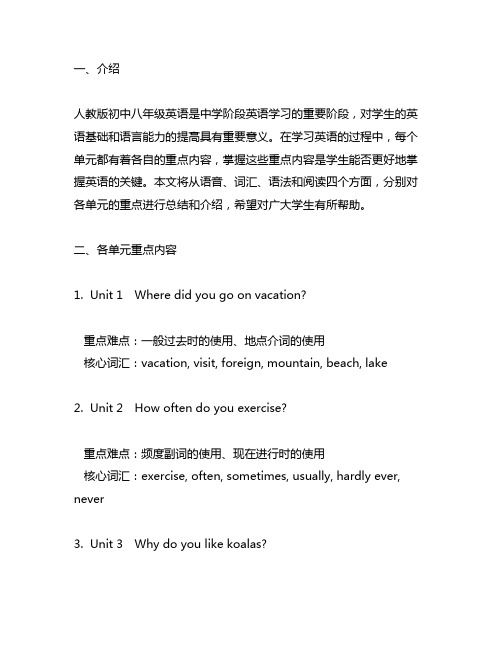
一、介绍人教版初中八年级英语是中学阶段英语学习的重要阶段,对学生的英语基础和语言能力的提高具有重要意义。
在学习英语的过程中,每个单元都有着各自的重点内容,掌握这些重点内容是学生能否更好地掌握英语的关键。
本文将从语音、词汇、语法和阅读四个方面,分别对各单元的重点进行总结和介绍,希望对广大学生有所帮助。
二、各单元重点内容1. Unit 1 Where did you go on vacation?重点难点:一般过去时的使用、地点介词的使用核心词汇:vacation, visit, foreign, mountain, beach, lake2. Unit 2 How often do you exercise?重点难点:频度副词的使用、现在进行时的使用核心词汇:exercise, often, sometimes, usually, hardly ever, never3. Unit 3 Why do you like koalas?重点难点:形容词性物主代词的使用、困难的句型whether引导的宾语从句核心词汇:koala, kangaroo, rmend, smart, cute4. Unit 4 I used to be afraid of the dark.重点难点:used to和be used to的区别、情态动词could的使用核心词汇:afraid, dark, thunder, storm, alone5. Unit 5 Do you want to watch a game show?重点难点:情态动词must的使用、陈述疑问句和特殊疑问句的变化核心词汇:game show, meaning, message, refuse, shelf6. Unit 6 I'm going to studyputer science.重点难点:一般将来时的使用、特殊疑问句和选择疑问句核心词汇:study, science, choice, voice, noise7. Unit 7 Will people have robots?重点难点:一般将来时的使用、被动语态的使用核心词汇:robot, scientist, hero, electricity, possible8. Unit 8 How do you make a banana milk shake?重点难点:祈使句的使用、过去进行时的使用核心词汇:banana, milk, shake, sugar, honey9. Unit 9 Can youe to my party?重点难点:情态动词can的使用、祈使句的变化核心词汇:party, concert, advise, worry, dish10. Unit 10 Where did you go on vacation?重点难点:比较级和最高级的用法、连词because和because of 的区别核心词汇:exciting, boring, noisy, interesting, expensive 三、总结学习初中八年级英语,熟练掌握各单元的重点内容对于学生来说至关重要。
人教版七年级上册英语各单元总结

人教版七年级上册英语各单元总结一、单元概述本册书共包含12个单元,每个单元都围绕一个主题展开,包括个人信息、家庭成员、学校生活、时间表达、动物世界、饮食和购物、天气和季节、方位和交通、旅行和旅游、兴趣爱好等。
每个单元都包含课文、单词、短语、语法、练习等部分,旨在帮助学生掌握英语基础知识,提高听、说、读、写能力。
二、各单元总结1. Unit 1:Welcome to the unit本单元主要介绍了如何用英语进行自我介绍和问候,包括基本句型和常用表达方式。
学生需要掌握一些基本的问候语和自我介绍的表达方式,如“Hello!My name is…”等。
同时,本单元还介绍了如何用英语进行家庭成员的介绍,包括家庭成员的称谓和关系。
2. Unit 2:This is my family本单元主要介绍了如何用英语介绍家庭成员,包括家庭成员的称谓和关系。
学生需要掌握一些基本的家庭成员称谓和表达方式,如“My father is a doctor.”等。
同时,本单元还介绍了如何用英语进行家庭生活的描述,包括家庭成员的喜好和生活习惯。
3. Unit 3:What color is it?本单元主要介绍了颜色的表达方式和相关词汇,包括颜色名称和形容词的用法。
学生需要掌握一些基本的颜色词汇和表达方式,如“red apple”等。
同时,本单元还介绍了如何用英语进行物品的颜色描述和询问。
4. Unit 4:Where's my backpack?本单元主要介绍了如何用英语描述物品的位置和方位关系,包括介词的用法。
学生需要掌握一些基本的方位介词和表达方式,如“on the table”等。
同时,本单元还介绍了如何用英语进行物品位置的询问和描述。
5. Unit 5:Do you have a soccer ball?本单元主要介绍了如何用英语进行体育用品的描述和询问,包括相关词汇和表达方式。
学生需要掌握一些基本的体育用品词汇和表达方式,如“soccer ball”等。
人教版初中英语七年级上册全册各单元知识点、语法归纳整理

人教版初中英语七年级上册全册各单元知识点、语法归纳整理She’s my sister.她是我的妹妹。
3.This is a picture of my family.这是我家人的一张照片。
4.In the first photo。
there’s my XXX.在第一张照片里,有我的爷爷。
5.This is my family tree.这是我的家谱。
6.What’s the name of your father?你父亲叫什么名字?7.Have a good day!过得愉快!重点语法1.名词所有格2.复数形式3.人称代词宾格4.指示代词this和these的用法5.介绍人物时的基本用语:This is …/These are…1.指示代词:this。
that。
these。
those - 这个,那个,这些,那些2.名词复数规则:1)一般情况下直接加s。
2)以s,x,sh,ch结尾的加es。
3)以辅音字母加y结尾的将y变i再加es。
4)以o结尾的加s或es。
(有生命+es物生命加s)5)以f/fe结尾的名词,先将f/fv变成v再加es。
3.人称代词:I。
he。
she。
it和they - 我,他,她,它,他们/她们/它们4.重点短语:Is this/that your。
- 这/那是你的……吗?Yes。
it is。
/ No。
it isn't。
- 是的,是它。
/ 不,不是。
XXX。
- 这些/那些是我的……Here are。
- 这里有……This/That is my。
- 这/那是我的……Have a good day。
- 祝你玩得愉快!Excuse me for interrupting。
but could I ask you a n?Thank you very much.Could you please speak in English?Do you enjoy playing computer games?Have you checked in the lost and found case to see if your item is there?Please call 685-6034 to reach me.I lost my school ID card and need to find it.I need a set of pencils for my art class.Key XXX structures:Is that your school bag?No。
人教版英语目录及单元详解经典总结9年级(全册)
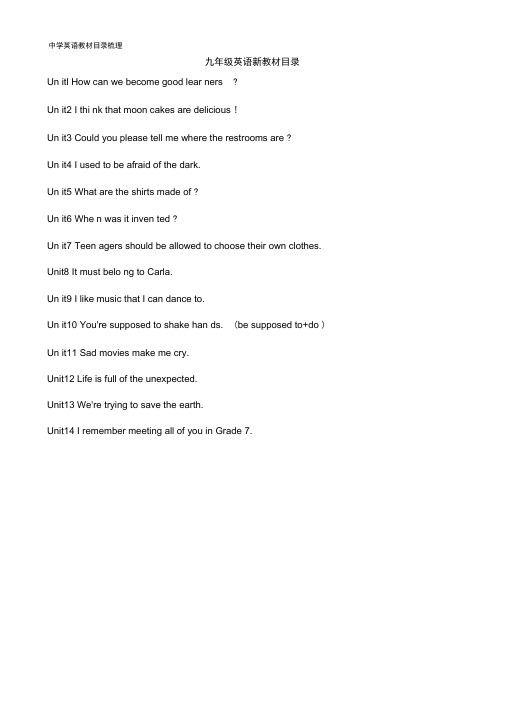
中学英语教材目录梳理九年级英语新教材目录Un itl How can we become good lear ners ?Un it2 I thi nk that moon cakes are delicious !Un it3 Could you please tell me where the restrooms are ?Un it4 I used to be afraid of the dark.Un it5 What are the shirts made of ?Un it6 Whe n was it inven ted ?Un it7 Teen agers should be allowed to choose their own clothes. Unit8 It must belo ng to Carla.Un it9 I like music that I can dance to.Un it10 You're supposed to shake han ds. (be supposed to+do ) Un it11 Sad movies make me cry.Unit12 Life is full of the unexpected.Unit13 We're trying to save the earth.Unit14 I remember meeting all of you in Grade 7.2中学英语教材目录梳理九年级单元标题Unit 1 How can we become good learners.单元话题谈论英语学习语法目标1、复习一般现在时;2、by的用法。
textbook /tekstbuk/ n. 教科书;课本p.1 pronounce /pr?nauns/ v. 发音p.5conversation /k?nv?se??/, n. 交谈;谈话p.2 increase /Inkri:s/ v. 增加;增长p.5aloud /?laud/ adv. 大声地;出声地p.2 speed /spi:d/ n. 速度v.加速p.5pronunciation /pr ?n?nsieI?n/ n. 发音;读音p.2 ability / ?bil ?ti/ n. 能力;才能p.6sentence /sent?ns/ n. 句子p.2 brain /brein/ n. 大脑p.6patient /pei?nt/ adj. 有耐心的n.病人p.2 active /ktiv/ adj. 活跃的;积极的p.6expression /ikspre?n/ n. 表达(方式);表示p.3 attention /?ten?i/ n. 注意;关注p.6discover /dlsk?v? (r)/ v. 发现;发觉p.3 pay attention to 注意;关注p.6重点secret /si:kr?t/ n. 秘密;adj.秘密的;p.3 connect /k nekt/ v.(使)连接;与??有联系p.6 词汇fall in love with 爱上;与??相爱p.3 connect …with 把?? 和??连接或联系起来p.6 grammar /gr?m ? (r)/ n. 语法p.3 overnight /uv? (r)nait/adv 一夜之间;在夜间p.6repeat /ripi:t/ v. 重复;重做p.4 review /rivju:/ v. & n. 回顾;复习p.6note /n?ut/ n. 笔记;记录v. pal/p?l/ n.注意;指出p.4朋友;伙伴p.4knowledge /n lid ?/,wisely /waizli/ adv.n.知识;学问p.6明智地;聪明地p.6 pattern /p?tn/, /p?t ?n/ n. 模式;方式p.4physics /fiziks/ n. 物理;物理学p.4chemistry /kemistri/ n. 化学p.4partner /pa:(r)tn ? (r)/ n. 搭档;同伴p.51」isen to tapes 听录音13.deal / do with 处理,应付2. ask the teacher for help 向老师请求帮助3. read aloud 朗读14.be angry with 生……的气15.go by (指时间)过去,消逝4. speaking skills 口头表达能力16.try one's best to do sth.尽力做……5.spoken English 英语口语6. end up 结束17.break off 突然中止,中断重点短语7.l ater on 以后,随后18. with the help of 在……的帮助下19.regard …as …把……当做•…8. make mistakes 犯错,岀错9.l augh at 嘲笑,取笑20.be afraid of doing / to do sth 害怕做某事10.take notes 做笔记,做记录21. first of all 首先,开始22. have trouble / a difficult / hard time doing sth.11.look …up (在词典、参考书等中)做某事有困难查阅,查找12. make up 编造,组成1.It ' s too hard to understand the voices. 理解那些话有困难。
新版英语人教版八年级上册各单元知识点

人教版八年级上册英语单元词组及搭配Unit1Wheredidyougoonvacation?goonvacation去度假stayathome待在家里gotothemountains去爬山gotothebeach去海visitmuseums参博物gotosummercamp去参夏令quite afew相当多studyfor⋯⋯而学goout出去mostofthetime大局部tastegood起来很好吃haveagoodtime玩得高ofcourse当然feellike⋯⋯的感;感受到goshopping去物inthepast在去walkaround四走走becauseof因onebo wlof一⋯碗⋯⋯thenextday第二天drinktea喝茶findout找出;明goontakep hotos照相somethingimportant重要的事upanddown上上下下comeup出来搭配buysth.forsb./buysb.sth.某人某物taste+adj.起来⋯⋯look+adj.看起来⋯⋯nothing⋯but+原形除了⋯⋯之外什么都没有seem+〔tobe〕+adj.看起来⋯⋯arrivein+大地点/arriveat+小地点到达某地decidetodosth.决定去做某事trydoingsth.做某事/trytodosth.尽力去做某事forgetdoingsth.忘做某事/forgettodosth.忘做某事enjoydoingsth.喜做某事wanttodosth.想去做某事startdoingsth.开始做某事stopdoingsth.停止做某事dislikedoingsth.不喜做某事keepdoingsth.做某事Whynotdo.sth.?什么不做⋯⋯呢?so+adj.+that+从句如此⋯⋯以至于⋯⋯tellsb.(not)todosth.告某人〔不要〕做某事语法:不定代词和一般过去时态Unit2Howoftendoyouexercise?词组helpwithhousework帮助做家onweekends在周末howoften多久一次hardlyever几乎从不onceaweek每周一次twiceamonth每月两次everyday每天befree有空gotothemovies去看影usetheInternet用互网swingdance舞playtennis打网球stayuplate熬夜;睡得很晚atleast至少havedanceandpianolessons上舞蹈和琴gotobedearly早点睡playsports行体育活begoodfor⋯⋯有好gocamping去野not⋯atall一点儿也不⋯⋯inone’sfreetime在某人的余themostpopular最受迎的suchas比方;如oldhabitsdiehard改gotothedentist去看牙医mornthan多于;超lessthan 少于搭配helpsb.withsth.帮助某人做某事Howabout⋯?......怎么?/⋯⋯好不好?wantsb.todosth.想某人做某事Howmany+可数名复数+一般疑句?⋯⋯有多少⋯⋯?主+find+that从句.⋯⋯⋯⋯spendtimewithsb.和某人一起度光It’s+adj.+to sthd.做某事的⋯⋯的。
人教版九年级英语各单元主题思维导图(1-10)

Key verbs
learn, study Improve, practice, repeat review, connect develop, discover, succeed increase, etc.
Challenges
speak too quickly (be)afraid to ask questions make mistakes in grammar can’t understand spoken English can’t get the pronunciation right don't know how to increase my reading speed don't know enough words to write well don't get much writing practice get bored ...
• 人教版九年级英语各单元主题思维导图(1—10单元)
初中英语人教版九年级全一册
Unit1 How can we become good learners?
单元主题思维导图
How Can You Become a Successful leaner?
阅读篇-Section B 2b
Section B 2b
Ask questions during or after class
Learning how to learn
单元整体话题篇
Structures
A: Do you learn English by reading aloud? B: Yes, I do. It helps with my pronunciation A: How can I improve my pronunciation? B: Well, one way is by listening to tapes.
人教版七年级下册英语各单元知识点归纳
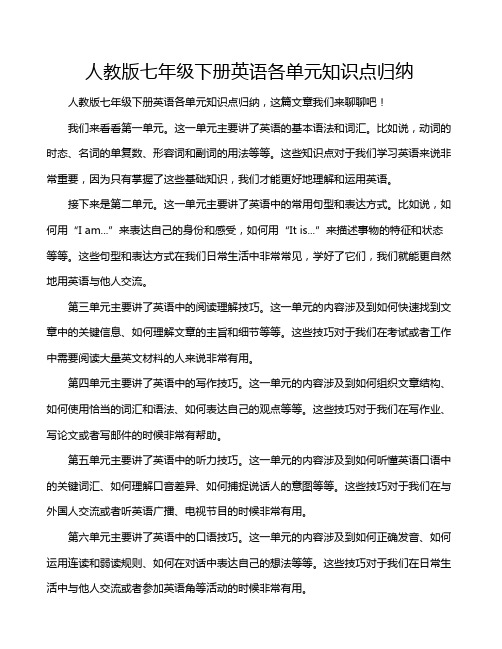
人教版七年级下册英语各单元知识点归纳人教版七年级下册英语各单元知识点归纳,这篇文章我们来聊聊吧!我们来看看第一单元。
这一单元主要讲了英语的基本语法和词汇。
比如说,动词的时态、名词的单复数、形容词和副词的用法等等。
这些知识点对于我们学习英语来说非常重要,因为只有掌握了这些基础知识,我们才能更好地理解和运用英语。
接下来是第二单元。
这一单元主要讲了英语中的常用句型和表达方式。
比如说,如何用“I am...”来表达自己的身份和感受,如何用“It is...”来描述事物的特征和状态等等。
这些句型和表达方式在我们日常生活中非常常见,学好了它们,我们就能更自然地用英语与他人交流。
第三单元主要讲了英语中的阅读理解技巧。
这一单元的内容涉及到如何快速找到文章中的关键信息、如何理解文章的主旨和细节等等。
这些技巧对于我们在考试或者工作中需要阅读大量英文材料的人来说非常有用。
第四单元主要讲了英语中的写作技巧。
这一单元的内容涉及到如何组织文章结构、如何使用恰当的词汇和语法、如何表达自己的观点等等。
这些技巧对于我们在写作业、写论文或者写邮件的时候非常有帮助。
第五单元主要讲了英语中的听力技巧。
这一单元的内容涉及到如何听懂英语口语中的关键词汇、如何理解口音差异、如何捕捉说话人的意图等等。
这些技巧对于我们在与外国人交流或者听英语广播、电视节目的时候非常有用。
第六单元主要讲了英语中的口语技巧。
这一单元的内容涉及到如何正确发音、如何运用连读和弱读规则、如何在对话中表达自己的想法等等。
这些技巧对于我们在日常生活中与他人交流或者参加英语角等活动的时候非常有用。
第七单元主要讲了英语中的文化知识。
这一单元的内容涉及到英美文化的差异、英国历史和地理等方面的知识。
了解这些知识可以帮助我们更好地理解和运用英语,同时也可以增进我们对不同文化的理解和尊重。
人教版七年级下册英语各单元知识点归纳是非常重要的一本书,它涵盖了许多我们在学习英语过程中需要掌握的基础知识和技能。
人教版初中英语各单元知识概括

be going to do强调事情已 计划好并将按照计划来做
Unit11
Couldyou
pleaseclean
your room?
委婉请求别人做某事,引导 词用can, shall, will等情态 动词的过去时态
情态动词表示请求的用法
祈使句四种形式:
Be型;
Do型;
Let型;
No +v-ing型;
Unit 12 Don'teat in class.
初二英语上册
Unit1
How often do you exercise?
提问用How often引导特
殊疑问句;
回答用always, sometimes, twice a day等频率副词。
问方式
Unit8
How was your school trip?
动词过去式变化规则;
一般过去时态结构及用法;
Unit9
When was he born?
谈论著名人物
一般过去时态用法
Unit10
I'm going to be a basketball player.
本单元重点强调be going to do的形式
(shall/will) be done;
一般将来时态的肯定句、否 定句、疑问句形式
Unit 2 What should I do?
过去将来时态形式:
(should/would) do,否定句,
情态动词should/would表示 义务的用法
疑问句,特殊疑问句的形式
Unit 3 What were you doing when the UFO arrived?
人教版九年级英语各单元重点章节总结
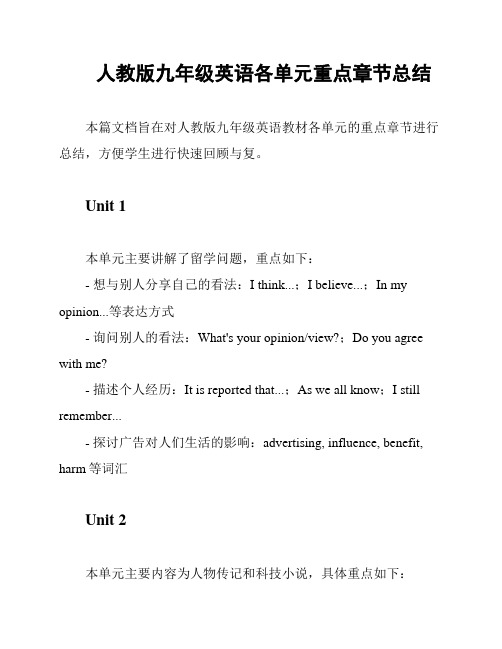
人教版九年级英语各单元重点章节总结本篇文档旨在对人教版九年级英语教材各单元的重点章节进行总结,方便学生进行快速回顾与复。
Unit 1本单元主要讲解了留学问题,重点如下:- 想与别人分享自己的看法:I think...;I believe...;In my opinion...等表达方式- 询问别人的看法:What's your opinion/view?;Do you agree with me?- 描述个人经历:It is reported that...;As we all know;I still remember...- 探讨广告对人们生活的影响:advertising, influence, benefit, harm等词汇Unit 2本单元主要内容为人物传记和科技小说,具体重点如下:- 描述事件发生的先后顺序:first/firstly, then, next, after that等表达方式- 描述人物的特点、经历和成就:honest, determined, brave, curious等形容词- 用比较级描述人物和事物:taller, faster, more interesting等- 推测事物发展或人物行为动机:may, might, must, can't等情态动词Unit 3本单元主要内容为句子结构和词汇知识,重点如下:- 形容词、副词比较级和最高级的用法:形容词+er/more+adj./the+adj.-est/most+adj.等表达方法- 状语从句的用法:when, while, as, because, although, if等引导词的使用- 描述天气现象和自然灾害:stormy, foggy, sandy, earthquake, tornado等词汇Unit 4本单元主要内容为表达自己的兴趣和计划,重点如下:- 询问别人的职业和计划:What do you want to be when you grow up?;What are you going to do this weekend?- 描述过去的事件和经历:learn, start, join, get等动词的变形- 手写和打字的差别:handwriting, typing等词汇- 书信和电子邮件的写作格式和技巧:Dear..., Sincerely..., Regards, Thank you for your time and kindness.等常用句式Unit 5本单元主要内容为环保问题和家族传统,重点如下:- 描述地球上的资源、环境污染和保护措施:recycle, reuse, reduce, save等词汇- 表达自己的偏好和看法:prefer, suggest, support, agree/disagree with, think/believe that等表达方式- 描述家庭成员关系和家族传统:parent, grandparent, ancestor等词汇- 描述家族的文化、节日和传统:Mid-Autumn Festival, Dragon Boat Festival, Spring Festival等词汇Unit 6本单元主要内容为现在进行时和一般现在时的用法,重点如下:- 现在进行时的构成、用法及一些常见的动词:am/is/are+现在分词,表示正在进行的动作- 一般现在时的构成、用法及词汇:am/is/are+形容词,表示客观真理或经常惯性的动作- 描述人的身体特征和装扮:tall, short, skinny, slim, wear, put on 等词汇- 描述人的性格和爱好:friendly, outgoing, quiet, funny, enjoy, love, hate等Unit 7本单元主要内容为感兴趣的职业和探究动物世界,重点如下:- 描述职业的要求、条件和职责:require, experience, skill, responsibility等词汇- 描述动物的生存环境和特征:habitat, survive, adapt, prey, predator等表达方式- 描述动物的行为惯和保护措施:hibernate, migrate, endangered species, animal protection等词汇Unit 8本单元主要内容为口才训练和国家地理,重点如下:- 描述比赛情况和比赛规则:participate, referee, score, rule等词汇- 表达自己的意见、决定和建议:think, consider, decide, suggest 等动词- 描述地理位置、地理特征和文化俗:continent, landscape, river, ocean, custom, tradition等- 探究国家形象和国家特产:national flag, national emblem, national costume, national product等Unit 9本单元主要内容为历史文化和生活方式,重点如下:- 描述名胜古迹和历史文化遗产:monument, palace, temple, ruin, Great Wall, Terracotta Warriors等词汇- 表达旅游经历和观光感受:visit, sightseeing, amazed, impressed等形容词- 描述传统俗和日常生活:ceremony, festival, custom, habit, lifestyle等词汇- 探究彼此间的异同和了解:difference, similarity, understand, respect等词汇以上是本文对人教版九年级英语各单元的重点章节做出的总结,希望对同学们的学习和复习有所帮助。
人教七年级英语单元知识点
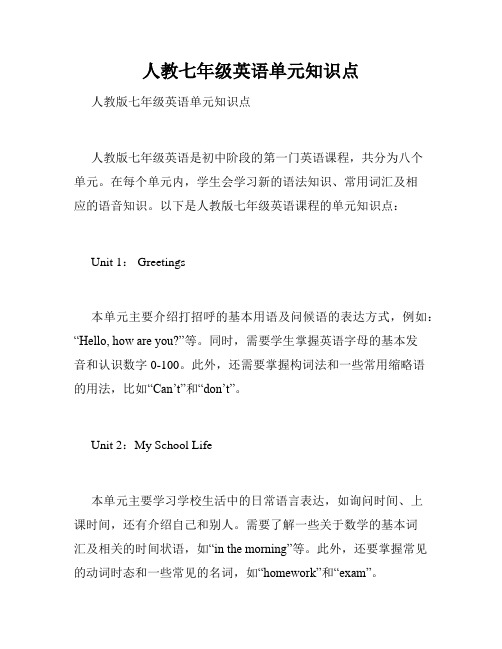
人教七年级英语单元知识点人教版七年级英语单元知识点人教版七年级英语是初中阶段的第一门英语课程,共分为八个单元。
在每个单元内,学生会学习新的语法知识、常用词汇及相应的语音知识。
以下是人教版七年级英语课程的单元知识点:Unit 1: Greetings本单元主要介绍打招呼的基本用语及问候语的表达方式,例如:“Hello, how are you?”等。
同时,需要学生掌握英语字母的基本发音和认识数字 0-100。
此外,还需要掌握构词法和一些常用缩略语的用法,比如“Can’t”和“don’t”。
Unit 2:My School Life本单元主要学习学校生活中的日常语言表达,如询问时间、上课时间,还有介绍自己和别人。
需要了解一些关于数学的基本词汇及相关的时间状语,如“in the morning”等。
此外,还要掌握常见的动词时态和一些常见的名词,如“homework”和“exam”。
Unit 3:Hobbies在本单元中,学生需要学习谈论自己的爱好,如喜欢做什么运动、看什么电影等。
同时,还需要学习一些形容词,如“interesting”和“boring”,以及一些常见的名词和动词,如“swimming”和“playing”.Unit 4:Our World本单元介绍地球的自然现象、环境保护和旅游等内容。
需要掌握一些关于自然的基本词汇,如“river”和“mountain”,掌握描述天气的基本语言,如“It’s sunny”,并了解如何表达自己想去某个城市的意愿,如“Let’s go to Beijing”。
Unit 5:Food and Drinks在本单元学生将学习如何介绍食物和饮料,如“Do you like chicken?”等。
需要掌握不同食物的名称和比喻,如“chicken wings”和“Chinese tea”。
同时还需要了解不同文化中对待食物的不同习惯,如不同国家的餐桌礼仪等。
Unit 6:Family and Friends本单元介绍家人与朋友之间的基本关系及如何介绍自己的家庭成员。
人教版初中英语九年级全册各单元知识点、语法归纳整理
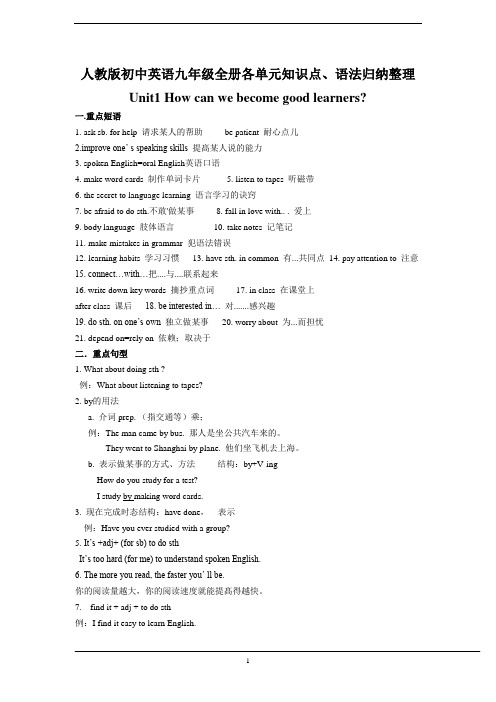
人教版初中英语九年级全册各单元知识点、语法归纳整理Unit1 How can we become good learners?一.重点短语1. ask sb. for help 请求某人的帮助be patient 耐心点儿2.improve one’ s speaking skills 提髙某人说的能力3. spoken English=oral English英语口语4. make word cards 制作单词卡片5. listen to tapes 听磁带6. the secret to language learning 语言学习的诀窍7. be afraid to do sth.不敢'做某事8. fall in love with.. . 爱上9. body language 肢体语言10. take notes 记笔记11.make mistakes in grammar 犯语法错误12.learning habits 学习习惯13. have sth. in common 有...共同点14. pay attention to 注意15. connect…with…把....与....联系起来16. write down key words 摘抄重点词17. in class 在课堂上after class 课后18. be interested in… 对.......感兴趣19. do sth. on one’s own 独立做某事20. worry about 为...而担忧21. depend on=rely on 依赖;取决于二.重点句型1. What about doing sth ?例:What about listening to tapes?2.by的用法a. 介词 prep. (指交通等)乘;例:The man came by bus. 那人是坐公共汽车来的。
人教版新目标英语 初中英语 新目标七--九册各单元简介

Rules
Talk about rules
谈论规定
祈使句
表示允许的can
情态动词have to
Don’t eat in class!
Can we wear hats?
No,we can’t.
We don’t have to wear a school uniform.
八年级(上)1—12单元基本介绍
Unit
Title
Topic
Functions
Structures
Target Language
1
How often do you exercise?
Free time activities
Talk about how often do you do things
谈论做某事的频率
点菜
What特殊疑问句
情态动词would
What size bowl of noodles would you like?
I’d like a large/medium/small bowl of noodles.
What kind of noodles would you like?
I’d like beef and tomato noodles,please.
Holidays
and vacations
Talk abou past events
谈论过去发生的事件
规则动词和不规则动词的一般过去时
was/were
How特殊疑问句
Where did you go on vacation?
We went to New York City.
初中英语人教版新教材七年级上册Starter Unit 1 单元教材分析(2024秋)

七年级英语上册Starter Unit1教材分析一、主题本单元的主题是“人与自我”范畴下的“生活与学习”主题群,子主题内容为多彩、积极向上的学校生活。
二、语篇(一) Section A 1a:多模态语篇【What】主题图呈现了中学校门口同学们互相打招呼的场景。
图中有七名同学,分别是Helen与Yaming、Fu Xing与Peter、Teng Fei与Ella 和Emma三组,每一组都是中国学生与外国学生打招呼,因此用英文。
活动任务是需要学生观察图片,并借助图中语言,将人物头像与姓名相匹配。
【Why】主题图通过这幅场景展示了同学们开朗积极的校园生活,以及中西方孩子之间相处融洽的关系。
英语是作为同学们互相交流、增进了解的一种工具而被使用。
活动任务是考查学生看图和读文的能力。
【How】图片中的语言都是用于开启对话的打招呼用语,且从同学们互相使用的名字称呼、没有加姓氏可见,他们都是互相熟悉的关系。
作为开学第一课,这个活动任务有助于引领学生熟悉教材人物角色及其关系,了解人物姓名有助于后期对话等语篇的理解。
(二)Section A 2a、2b音频语篇【What】这个音频语篇是26个字母的发音学习内容,活动任务是让学生听读字母,并练习书写大小写字母。
四线三格中呈现的是书写体字母。
【Why】新教材注重语音教学,一次性呈现所有26个字母,更好地衔接了小学教材。
【How】这个活动从学生的听、读、写三方面进行字母学习和训练,工整清晰美观的书写体样本有利于学生观摩学习,同时为本单元后期的自然拼读学习打好基础。
(三)Section A 2c:听力对话【What】2c活动呈现的是一幅课堂师生交谈图和三组包含四个空格的对话及方框中四个备选句,这四句的功能各异,A选项是告别用语,B选项是询问姓名用语,C选项是早晨问候语,D选项是询问对方姓名如何拼读的用语,活动任务是让学生通过听力将正确的功能句选入对话空格。
【Why】学生借助图片、对话框架和备选句,通过听力活动理解、内化功能句的使用情境。
人教版初中英语各单元重点语法分析

would like用法 一般过去时态
make sb.do.sth. 使某人做某事 think of 祈使句
频度副词的用法 情态动词should的用法
现在进行时表将来 how\how long,how far 引导的特殊疑问句
动词短语 被动语态 过去完成时 宾语从句 be supposed to 的用法 不定式和形容词作make宾补 现在完成时 动词的时态
很好
好
一般
弱
不懂
by +doing sth
used to do sth的用法 情态动词should +被动语态
unit4 unit 5 unit6 unit7 unit 8 unit 9 unit 10 unit 11 unit 12 unit 13 unit 14 unit 15
虚拟语气 情态动词表示推断
定语从句 would\hope to 表达意愿
名词所有格用法
have用法;do/does 用法;一般现在时
like的用法;名词的分类
询问价格的表达方法;.for的用法
月份单词;基数词变序数词;询问年龄
can的用法 一般现在时;时间的表达法
感叹句;时刻表达法 be from用法
(问路)、指路的表达法;enjoy doing sth 特殊疑问句
询问职业的表达法 现在在进行时
情态动词can的用法 形容词和副词的比较级及than句型
可数名词和不可数名词的用法 一般过去时
when \how long 引导的特殊疑问句 be going to 表示一般将来时的用法 提出请求的句型 could you please…?的用法
初中人教新目标英语目录及知识点梳理

七年级上册StarterUnit1 Good morning!【重难点】问候:Good morning/ afternoon/evening/night!Hi/Hello!Starter Unit 2 What’s this in English?【重难点】询问物品:(1) What’s this in English It is…(2)What’s that in English It is…Starter Unit3 What color is it【重难点】询问颜色:(1) -What colour is it -It is…(2)-What colour are they -They’re…Unit1 My name’s Gina.【重难点】(1)What 引导的特殊疑问↗询问姓名↘询问号码(2)adj.物主代词(3)be一般现在时Unit2 This is my sister.【重难点】(1)指示代词this, that, these, those 用法(2)人称代词的主格和宾格(3)名词变复数Unit3 Is this your pencil【重难点】(1) be一般疑问句(2) 名词性物主代词Unit4 Where’s my school bag【重难点】(1) Where 引导的特殊疑问句:询问地点(2) 方位介词on, under 和in 的用法Unit5 Do you have a soccer ball【重难点】实意动词have/has 的一般现在时Unit 6 Do you like bananas【重难点】(1) 实意动词一般现在时的肯定句、否定句、一般疑问句(2) 可数名词、不可数名词Unit7 How much are these socks【重难点】询问价格、基数词Unit8 When is your birthday【重难点】(1) When引导的特殊疑问句询问时间(2) 日期的表达、序数词、名词所有格Unit9 My favorite subject is science.【重难点】(1) What引导的特殊疑问句询问喜爱的科目(2) Who 引导的特殊疑问句询问人七年级下册Unit1 Can you play the guitar【重难点】情态动词can 的用法Unit2 What time do you go to school【重难点】时刻的表达法、时间介词at, in和onUnit3 How do you get to school?【重难点】How/How long/How far… 引导的特殊疑问句Unit4 Don't eat in the class.【重难点】祈使句Unit5 Why do you like pandas?【重难点】Why 引导的特殊疑问句Unit6 I'm watching TV!【重难点】现在进行时定义、句式结构、标志、现在分词的构成Unit7 It's raining!【重难点】(1)How引导的特殊疑问句询问天气情况(2)现在进行时与一般现在时的区别Unit8 Is there a post office near here?【重难点】(1) There be 句型(2) 表示方位的介词及介词短语Unit9 What does he look like?【重难点】(1) 询问及描述外貌(2) 形容词的用法及排序(3)形容词几点特殊用法Unit10 I'd like some noodles .【重难点】(1) would like 的用法(2) 名词的分类及用法(3) 可数名词的复数变化Unit11 How was your school trip【重难点】一般过去时Unit12 What did you do last weekend?【重难点】一般过去时八年级上册Unit 1 Where did you go on vacation【重难点】(1) 复习一般过去时(2) 不定代词和不定副词的用法Unit 2 How often do you exercise【重难点】(1)How often 引导的特殊疑问句(2) 频率副词Unit 3 I’m more outgoing than my sister.【重难点】形容词、副词的比较级Unit 4 What’s the best movie theater【重难点】形容词、副词的最高级Unit 5 Do you want to watch a game show 【重难点】(1)动词不定式(2)双宾语Unit 6 I’m going to study computer science.【重难点】be going to 一般将来时Unit 7 Will people have robots【重难点】(1) will/shall 一般将来时(2) There be 句型的一般将来时Unit 8 How do you make a banana milk shake【重难点】(1)可数名词数的表达(2)不可数名词数的表达Unit 9 Can you come to my party【重难点】(1) 情态动词can的用法(2) can与be able to 的区别Unit 10 If you go to the party, you’ll have a great time.【重难点】(1) if 引导的条件状语从句(2)情态动词should的用法八年级下册Unit1 What’s the matter【重难点】询问情况Unit2 I'll help clean up the city parks.【重难点】will 一般将来时Unit3 Could you please clean your room .【重难点】委婉表达方法Unit4 Why don't you talk to your parents【重难点】表达建议Unit5 What were you doing when the rainstorm came 【重难点】过去将来时Unit6 An old man tried to move the mountains .【重难点】一般过去时,过去将来时Unit7 What's the highest mountain in the world【重难点】adj. adv. 最高级Unit8 Have you read Treasure Island yet 【重难点】现在完成时Unit9 Have you ever been to a museum 【重难点】现在完成时Unit10 I've had this bike for three years. 【重难点】现在完成时九年级全一册Unit 1 How can we become good learners【重难点】(1)介词by 的用法(2)介词by, in 和with 的区别Unit 2 I think that mooncakes are delicious!【重难点】that, if 和whether 引导的宾语从句Unit 3 Could you please tell me where the restrooms are【重难点】Wh- 特殊疑问词引导的宾语从句Unit 4 I used to be afraid of the dark.【重难点】(1)used to do 的用法(2)be used to do sth,be used to doing sth,used to do sth. 区别Unit 5 What are the shirts makde of【重难点】一般现在时的被动语态Unit 6 When was it invented【重难点】一般过去时的被动语态Unit 7 Teenagers should be allowed to choose their own clothes. 【重难点】情态动词should的被动语态Unit 8 It must belong to Carla.【重难点】情态动词表示推测Unit 9 I like music that I can dance to.【重难点】定语从句Unit 10 You're supposed to shake hands.【重难点】(1)be supposed to do sth. 句型(2)be expected to do sth. 句型(3)It is+adj.+to do sth. 句型Unit 11 Sad movies make me cry.【重难点】make 的用法Unit 12 Life is full of the unexpected.【重难点】过去完成时Unit 13 We're trying to save the earth!【重难点】现在进行时,现在完成时,被动语态Unit 14 I remember meeting all of you in Grade 7【重难点】特殊疑问句的用法,一般现在时,一般过去时,一般将来时。
- 1、下载文档前请自行甄别文档内容的完整性,平台不提供额外的编辑、内容补充、找答案等附加服务。
- 2、"仅部分预览"的文档,不可在线预览部分如存在完整性等问题,可反馈申请退款(可完整预览的文档不适用该条件!)。
- 3、如文档侵犯您的权益,请联系客服反馈,我们会尽快为您处理(人工客服工作时间:9:00-18:30)。
初中英语(新目标)七八九年级概要综合整理(新)
七年级上册:
第一单元:
1.be的一般现在时形式。
2.what引导的特殊疑问句。
3.形容词性物主代词。
4.number in english。
第二单元:
1.指示代词this和that,these,those的用法。
2.疑问代词who的用法。
第三单元:
1.t指示代词this和that,these,those的一般疑问句。
2.名词性物主代词的用法。
第四单元:
1.where引导的特殊疑问句。
2.表示方位的介词on、in、under的用法及常见表示方位介词。
第五单元:
1.动词have的一般现在时用法。
2.一般现在时(1)
第六单元:
1.可数和不可数名词。
2.一般现在时(2)
第七单元:
1.how much的用法
2.基数词
第八单元:
1.基数词1-100及序数词1-40.
2.名词的所有格。
第九单元:
1. 掌握特殊疑问句的句型特点。
2. 学会用特殊疑问句提问和回答。
七年级下册:
第一单元:
What 引导的特殊疑问句;情态动词can的用法
第二单元:
1.when和what time引导的特殊疑问句。
2.时间表达法
第三单元:
询问和表达交通方式
第四单元:
情态动词must ,can
第五单元:
why引导的特殊疑问句
第六单元:
现在进行时(1)。
第七单元:
1.询问天气;
2.现在进行时(2).
第八单元:
There be句型
第九单元:
1.询问及描述外貌。
2.形容词。
第十单元:
1.Would like 的用法。
2.可数名词与不可数名词。
第十一单元:
一般过去时(1)
第十二单元:
一般过去时(2)
八年级上册:
第一单元:
实义动词的一般过去时态
第二单元:
1.一般现在时,2,频度副词的用法
第三单元:
形容词和副词的比较级。
第四单元:
形容词的最高级。
第五单元:
动词不定试作宾语
第六单元:
一般将来时:be going to的用法
第七单元:
一般将来时:will的用法
第八单元:
祈使句的用法
第九单元:
情态动词kan的用法
第十单元:
If引导的条件状语从句
八年级下册:
第一单元:
一般将来时。
第二单元:
情态动词could,should的用法。
第三单元:
1..过去进行时。
第四单元:
直接引语和间接引语
第五单元:
1.be doing ,be going to,will在表示将来式上的区别。
2.if引导的时间状语从句。
第六单元:
1.现在完成进行时。
2.一般过去时和现在进行时。
第七单元:
1.Would you mind的用法。
2.Could you do sth---?
第八单元:
1.现在完成时。
2.征求意见和提出建议的表达。
第九单元:
1.现在完成时的“完成用法”和未完成用法。
2.现在完成时态中要注意的问题。
3.Have you ever been to ---?句型及回答
第十单元:
反意疑问句。
九年级全册:
第一单元:
1.by+doing结构。
2.现在完成时。
第二单元:
“used to+动词原形”表示过去的习惯。
第三单元:
被动语态,should be allowed to do sth.
第四单元:
虚拟语气(if引导的非真实性条件状语从句)。
第五单元:
情态动词表示推测。
must;might;could;can't
第六单元:
定语从句(that;who).
第七单元:
1.由where;when引导的定语从句。
2.动词不定式。
第八单元:
动词短语。
第九单元:
各种时态的被动语态的基本构成及用法。
第十单元:
过去完成时。
第十一单元:
宾语从句。
第十二单元:
Be supposed to 的用法。
第十三单元:
宾语补足语。
第十四单元:
现在完成时的用法及现在完成时与一般过去时的区别。
第十五单元:
各种时态的复习;复习动词的时态和语态。
